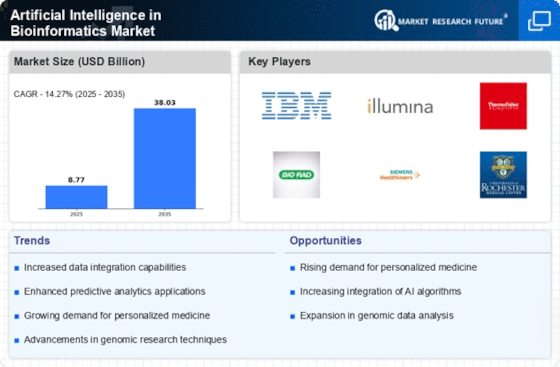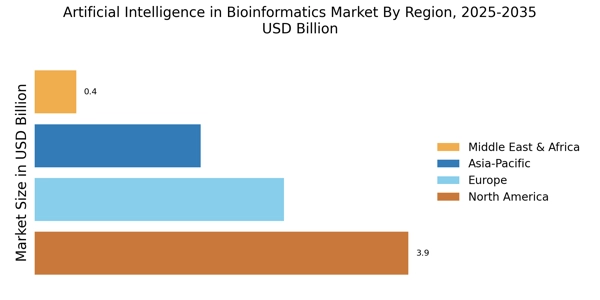Advancements in Drug Discovery
In the realm of drug discovery, the Artificial Intelligence in Bioinformatics Market is witnessing transformative advancements. AI-driven platforms are being utilized to identify potential drug candidates more efficiently, significantly reducing the time and cost associated with traditional methods. Reports suggest that AI can decrease the drug discovery timeline by up to 50%, which is a compelling incentive for pharmaceutical companies. The ability to analyze vast datasets and predict molecular interactions positions AI as a critical player in the bioinformatics landscape, fostering innovation and expediting the development of new therapeutics.
Enhanced Collaboration Across Sectors
Collaboration between various sectors is a driving force in the Artificial Intelligence in Bioinformatics Market. Partnerships between academic institutions, research organizations, and biotechnology firms are fostering innovation and accelerating the development of AI-driven bioinformatics solutions. These collaborations often lead to the sharing of resources, expertise, and data, which enhances research capabilities. As the industry continues to evolve, such partnerships are likely to become more prevalent, facilitating the exchange of knowledge and driving advancements in AI applications within bioinformatics.
Growing Focus on Preventive Healthcare
The shift towards preventive healthcare is significantly influencing the Artificial Intelligence in Bioinformatics Market. With an increasing emphasis on early disease detection and management, AI technologies are being leveraged to analyze patient data and identify risk factors. This proactive approach not only improves patient outcomes but also reduces healthcare costs. The market for preventive healthcare solutions is expanding, and AI's role in bioinformatics is becoming increasingly vital. By enabling more accurate risk assessments and personalized health strategies, AI is poised to play a crucial role in the future of healthcare.
Rising Demand for Genomic Data Analysis
The Artificial Intelligence in Bioinformatics Market is experiencing a surge in demand for genomic data analysis. As the volume of genomic data generated continues to increase, the need for advanced analytical tools becomes paramount. AI technologies, particularly machine learning algorithms, are being employed to process and interpret complex genomic datasets. This trend is underscored by the fact that The Artificial Intelligence in Bioinformatics is projected to reach substantial figures, indicating a robust growth trajectory. The integration of AI in bioinformatics not only enhances the accuracy of genomic analyses but also accelerates the pace of research, thereby driving the market forward.
Integration of AI with Big Data Technologies
The convergence of AI with big data technologies is reshaping the Artificial Intelligence in Bioinformatics Market. The ability to harness large volumes of biological data, coupled with AI's analytical capabilities, is enabling researchers to uncover insights that were previously unattainable. This integration facilitates real-time data processing and enhances predictive modeling, which is crucial for applications such as disease outbreak prediction and personalized treatment plans. As organizations increasingly adopt big data solutions, the synergy between AI and bioinformatics is likely to propel market growth, creating new opportunities for innovation.

















